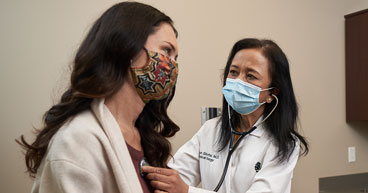
After decades of encouraging news about cancer, such as higher survival rates, a recently published National Cancer Institute (NCI) study offered an alarming projection: Generation X will be the first generation on record to have more cancer diagnoses than the generation before it.
According to the research, when Gen Xers start turning 60 in 2025, they’re more likely to be diagnosed with invasive cancer than Baby Boomers were at age 60. What’s more, if things don’t change, “cancer incidence in the United States could remain unacceptably high for decades to come.”
The conclusion came as a surprise to researchers, who noted recent declines in cancer incidence, thanks to early detection and educational efforts.
“We are clearly seeing progressively younger patients with cancer diagnoses—especially colorectal,” says Marlon Kleinman, MD, a hematologist-oncologist at City of Hope® Cancer Care North Shore. “The results of this study clearly create an intervention template, highlighting the relevance of early screening and detection, heightened symptomatic awareness and more focus on root behaviors that influence disease formation, such as diet, adequate sleep, exercise, reducing stress and mindfulness of our psycho-social health. It is critical that we offer more detailed recommendations to our patients—especially our younger patients—regarding the lifestyle choices we make.”
Although the report stops short of giving specific reasons for the concerning models, the study’s authors point to obesity, inactive lifestyles and pollution as possible culprits.
Gen Xers are considered those born between 1965 and 1980, while the previous generation—the Baby Boomers—refer to those born between 1946 and 1964.
In this article, we’ll explore:
- Cancer rates among Gen X
- What’s behind the increasing Gen X cancer rate?
- Why prevention strategies are key
If you’ve been diagnosed with cancer and are interested in a second opinion on your diagnosis and treatment plan, call us or chat online with a member of our team.
Cancer rates among Gen X
According to the NCI study, cancer is more likely to impact Gen Xers than any prior generation born between 1908 and 1964. In women, declines in lung and cervical cancers have been overtaken by increases in:
- Colorectal cancer
- Kidney cancer
- Leukemia
- Non-Hodgkin lymphoma
- Ovarian cancer
- Pancreatic cancer
- Thyroid cancer
- Uterine cancer
In men, researchers found that declines in lung cancer, liver cancer, gallbladder cancer and non-Hodgkin lymphoma, have been offset by increases in:
- Colorectal cancer
- Kidney cancer
- Leukemia
- Prostate cancer
- Thyroid cancer
Ajaz Khan, MD, MBA, CPE, a medical oncologist and Chair of the Department of Medical Oncology at City of Hope Cancer Centers in Atlanta, Chicago and Phoenix, told Crain’s Chicago Business he’s troubled by the number of younger patients he’s seeing with cancer—what’s commonly referred to as “early-onset cancer,” defined as cancer diagnosed in adults under age 50.
“Many more are showing up before the typical screening ages, with breast cancers showing up in patients in their 30s and colon cancers showing up in their 40s,” he says.
What’s behind the increasing Gen X cancer rate?
The NCI study examined age at cancer diagnosis and year of birth to determine how cancer rates at a given age changed over time.
Age is the primary risk factor for most cancers and Americans today are living longer with cancer than ever before. That’s thanks, in part, to the significant strides modern medicine has made in reducing the rate of heart disease. As heart disease deaths decline, more people are living long enough to be diagnosed with cancer.
We’re also better able to detect cancer than ever before, which may be a factor in more cancers being found.
“An important factor is whether increased cancer diagnosis means that there is more cancer or more diagnosis of cancer,” says Daniel Bruetman, MD, MMM, a medical oncologist at City of Hope Cancer Care Downtown Chicago. “We have many tests that can detect more cancer and screening has become more prevalent.”
We also have better therapies and treatments, leading to fewer cancer deaths. So even if Gen Xers are more likely to receive a cancer diagnosis than their parents, they’re less likely to die from the disease. More than 17 million Americans are living today after a cancer diagnosis.
Factors affecting Gen X
In recent years, study after study has pointed to significantly increasing obesity rates among adults in the United States. And many of the cancers the study projects to increase in incidence among Gen Xers are associated with obesity and lifestyle risk factors, like not getting enough physical activity.
According to the NCI study, “some portions of these increases can be attributed to rising obesity rates and sedentary lifestyles,” as well as environmental effects, like pesticides, air pollutants and toxic chemicals. Among the possible culprits: PFAs, a class of man-made chemicals found in everything from cosmetics to non-stick pans, and often referred to as “forever chemicals” because it can take thousands of years for them to break down in the environment.
PFAS have been linked to several types of cancer, including:
- Testicular cancer
- Ovarian cancer
- Kidney cancer
- Breast cancer
Poor diets that are high in ultra-processed foods, sugary drinks, red meat and alcohol also play a role. They contribute—by themselves but, especially, in concert—to alter our body’s internal processes, disrupting metabolism and triggering long-term inflammation.
Pankaj Vashi, MD, AGAF, FASPEN, Vice Chief of Staff and Medical Director of Gastroenterology/Nutrition & Metabolic Support at City of Hope Cancer Center Chicago, says the incidence of colorectal and pancreatic cancer will be higher in Generation X due to lifestyle factors.
In fact, the U.S. Preventive Services Task Force (USPSTF) now recommends people at an average risk for colorectal cancer start screening for the disease at age 45 instead of 50.
Why prevention strategies are key
The NCI study concludes that if current trends in risk factors like obesity and a sedentary lifestyle continue, cancer incidence in the United States could offset gains for generations.
“The concerning trends in rising cancer risk likely have several causative factors, including the continuing epidemic of obesity in the United States and other lifestyle issues,” says Maurie Markman, MD, President of Medicine & Science at City of Hope Cancer Centers in Atlanta, Chicago and Phoenix.
“We know that the lifetime risk for a number of cancers is very much influenced by weight and obesity,” Dr. Markman says. “We can anticipate a wave of these cancers if we can’t attack this problem.”
While cancer risk factors like obesity, poor diet and not enough physical activity play a pivotal role in the rise of cancer diagnoses among Gen Xers, they’re not the whole story, of course. Plenty of people younger than age 50 eat a healthy diet and get enough exercise but still develop cancer. The difference is we can do something about the risk factors we know, like smoking and alcohol use, diet and physical activity.
Getting regular exercise, in fact, is linked to a reduced risk of developing up to 13 types of cancer.
That’s why the Centers for Disease Control and Prevention (CDC) says, “Many things are associated with cancer, but avoiding tobacco use and keeping a healthy weight are two of the most important steps you can take to lower your risk of getting cancer.”
Another critical step we can take in reversing the course of cancer incidence is getting recommended cancer screenings, which are designed to help find cancer early, when it’s easier to treat—before symptoms develop and before the disease has a chance to spread.
If you’ve been diagnosed with cancer and are interested in a second opinion on your diagnosis and treatment plan, call us or chat online with a member of our team.


